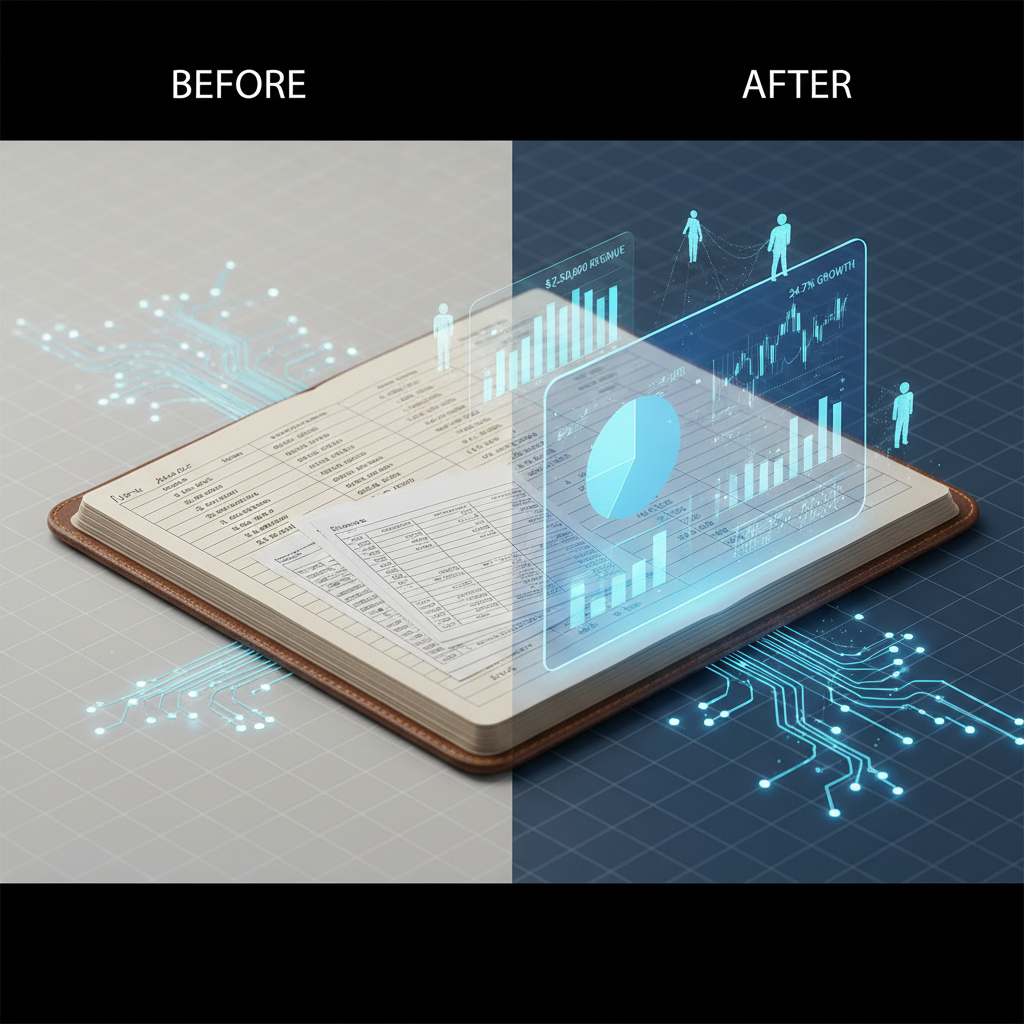
Frameworks, core principles and top case studies for SaaS pricing, learnt and refined over 28+ years of SaaS-monetization experience.
Thank you! Your submission has been received!
Oops! Something went wrong while submitting the form.
Join companies like Zoom, DocuSign, and Twilio using our systematic pricing approach to increase revenue by 12-40% year-over-year.

In today's data-driven business environment, financial reporting has evolved beyond static spreadsheets and manual calculations. The emergence of agentic AI—artificial intelligence systems that can operate autonomously on behalf of users—is revolutionizing how businesses gather, analyze, and present financial information. These accounting intelligence systems powered by AI are not just changing how we report financial data; they're transforming how we understand it.
Traditional financial reporting has always been labor-intensive. Accountants spent countless hours collecting data, reconciling accounts, and formatting reports. This process was not only time-consuming but prone to human error.
According to a study by Gartner, finance teams typically spend 80% of their time collecting and organizing financial data, leaving only 20% for value-adding analysis. This imbalance represents a significant opportunity cost for businesses.
The progression from manual bookkeeping to automated accounting software was the first major shift. Now, we're witnessing the next leap forward: financial reporting AI that doesn't just automate tasks but actively enhances the entire process with intelligence and foresight.
Agentic AI differs from traditional automation in its ability to:
These capabilities make agentic AI particularly powerful for accounting intelligence applications. Rather than just producing reports, these systems become active partners in financial management.
Traditional financial reporting operates on a cyclical basis—monthly, quarterly, or annually. Agentic AI systems can continuously monitor financial data and provide real-time analysis.
"Real-time financial reporting enabled by AI can reduce the financial close process from days to hours," notes a 2023 KPMG report on accounting technology trends.
This capability allows businesses to identify trends, anomalies, or opportunities as they emerge rather than discovering them after the fact.
Financial analysis powered by AI goes beyond basic calculations to identify complex patterns in financial data. These systems can:
A study by Deloitte found that companies using AI-enhanced financial analysis improved their forecasting accuracy by 25-50% compared to traditional methods.
Report automation through agentic AI doesn't just mean faster report generation—it means smarter reporting tailored to specific audiences and needs.
These systems can:
"The most valuable aspect of AI in financial reporting isn't just automation—it's the ability to deliver the right financial insights to the right people at the right time," explains Dr. Sean Stein Smith, accounting professor and blockchain specialist.
Despite its transformative potential, implementing agentic AI for financial reporting comes with significant challenges:
AI systems are only as good as the data they receive. Many organizations struggle with fragmented financial data across multiple systems, inconsistent data formats, and data quality issues. Successful implementation requires a comprehensive data strategy before deploying AI solutions.
Financial reporting is subject to strict regulatory requirements. Organizations must ensure that AI systems maintain audit trails, follow accounting principles, and provide sufficient transparency into their decision-making processes.
The American Institute of CPAs (AICPA) has begun developing guidelines for AI in accounting, emphasizing that these systems must support—not undermine—proper financial controls.
Perhaps the most significant challenge is human: accounting teams must adapt to working alongside intelligent systems. This requires not only technical training but a shift in mindset from viewing AI as a replacement to seeing it as an enhancement of human capabilities.
Looking ahead, several trends are emerging in accounting intelligence systems:
Future systems will likely move beyond reporting to actually managing certain financial operations autonomously, such as accounts payable processing, revenue recognition, or even tax filing—all with appropriate human oversight.
Financial reporting AI will increasingly connect with other business intelligence systems, creating a unified view of financial, operational, and market data. This integration will provide more contextual understanding of financial performance.
Emerging systems are incorporating natural language interfaces that allow executives and stakeholders to simply ask questions about financial performance and receive immediate, intelligent responses based on real-time data.
For organizations looking to harness the power of agentic AI in their financial reporting processes, consider these steps:
Financial reporting with agentic AI represents more than just another technology upgrade—it signals a fundamental shift in how organizations understand and leverage financial information. Accounting intelligence systems powered by AI offer unprecedented capabilities to process, analyze, and communicate financial data in ways that create genuine competitive advantages.
For forward-thinking organizations, the question isn't whether to adopt these technologies but how to integrate them strategically to enhance human capabilities, improve decision-making, and drive business performance.
As financial reporting continues to evolve, the most successful organizations will be those that effectively combine human financial expertise with the analytical power, speed, and intelligence of agentic AI systems.

Join companies like Zoom, DocuSign, and Twilio using our systematic pricing approach to increase revenue by 12-40% year-over-year.